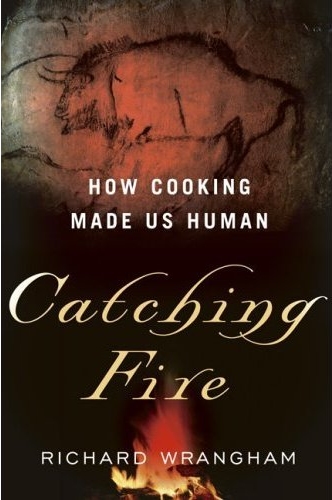Catching Fire: How Cooking Made Us Human - Richard Wrangham

## Metadata
- Author: **Richard Wrangham**
- Full Title: Catching Fire: How Cooking Made Us Human
- Category: #books
## Highlights
- > “[Fire] provides us warmth on cold nights; it is the means by which they prepare their food, for they eat nothing raw save a few fruits . . . the Andamanese believe it is the possession of fire that makes human beings what they are and distinguishes them from animals.”
—A. R. RADCLIFFE-BROWN, The Andaman Islanders: A Study in Social Anthropology ([View Highlight](https://read.readwise.io/read/01jhcbmwcbzay5a6vzh9dwvkq4))
## New highlights added January 13, 2025 at 7:15 AM
- Raw-foodists, it is clear, do not fare well. They thrive only in rich modern environments where they depend on eating exceptionally high-quality foods. Animals do not have the same constraints: they flourish on wild raw foods. The suspicion prompted by the shortcomings of the Evo Diet is correct, and the implication is clear: there is something odd about us. We are not like other animals. In most circumstances, need cooked food. ([View Highlight](https://read.readwise.io/read/01jheypq7x1b6nbhwdwwyd97rs))
- Cooked food is better than raw food because life is mostly concerned with energy. So from an evolutionary perspective, if cooking causes a loss of vitamins or creates a few long-term toxic compounds, the effect is relatively unimportant compared to the impact of more calories. A female chimpanzee with a better diet gives birth more often and her offspring have better survival rates. In subsistence cultures, better-fed mothers have more and healthier children. In addition to more offspring, they have greater competitive ability, better survival, and longer lives. When our ancestors first obtained extra calories by cooking their food, they and their descendants passed on more genes than others of their species who ate raw. The result was a new evolutionary opportunity. ([View Highlight](https://read.readwise.io/read/01jheywdaa24psdzcwaqqj8ppb))
- For more than 2.5 million years our ancestors have been cutting meat off animal bones, and the impact was huge. A diet that included raw meat as well as plant foods pushed our forebears out of the australopithecine rut, initiated the evolution of their larger brains, and probably inspired a series of food-processing innovations. But according to the evidence carried in our bodies, it would take the invention of cooking to convert habilines into Homo erectus, and launch the journey that has led without any major changes to the anatomy of modern humans. ([View Highlight](https://read.readwise.io/read/01jheyym6d1k025312g8yfym88))
## New highlights added January 19, 2025 at 8:48 PM
- > “The labor of women in the house, certainly, enables men to produce more wealth than they otherwise could; and in this way women are economic factors in society. But so are horses . . . the horse is not economically independent, nor is the woman.”
—CHARLOTTE PERKINS GILMAN,
Women and Economics: A Study of the
Economic Relation Between Men and Women
as a Factor in Social Evolution ([View Highlight](https://read.readwise.io/read/01jj0zssfn6ck6dqw0afxkwpfd))
## New highlights added January 19, 2025 at 9:48 PM
- Once our ancestors controlled fire, they could keep warm even when they were inactive. The benefit would have been high: by losing their hair, humans would have been better able to travel long distances during hot periods, when most animals are inactive. They could then run for long distances in pursuit of prey or to reach carcasses quickly. By allowing body hair to be lost, the control of fire allowed extended periods of running to evolve, and made humans better able to hunt or steal meat from other predators. ([View Highlight](https://read.readwise.io/read/01jj10r2fvm83p6b567xb6akrh))
- Nowadays, human babies are unique among primate infants in having an especially thick layer of fat close to the skin. Baby fat could well be partly a thermal adaptation to the loss of chimpanzee-like hair. ([View Highlight](https://read.readwise.io/read/01jj10tw077ky0bn99tkh6rkvx))
- The Coppingers suggest that when wolves were attracted to these potent new food resources, there was intense natural selection in favor of the calmer individuals, because the calmer wolves were able to get closer to the settlements and more easily find the precious new foods. In effect, dogs experienced a form of self-domestication. ([View Highlight](https://read.readwise.io/read/01jj10xk963cn1kmf5vxvgwgkh))